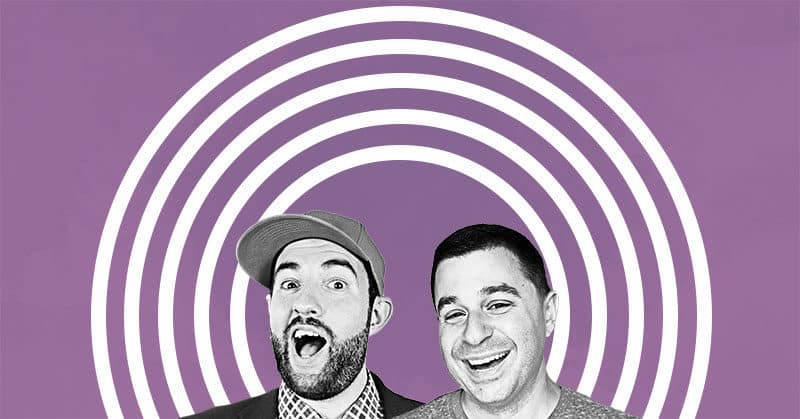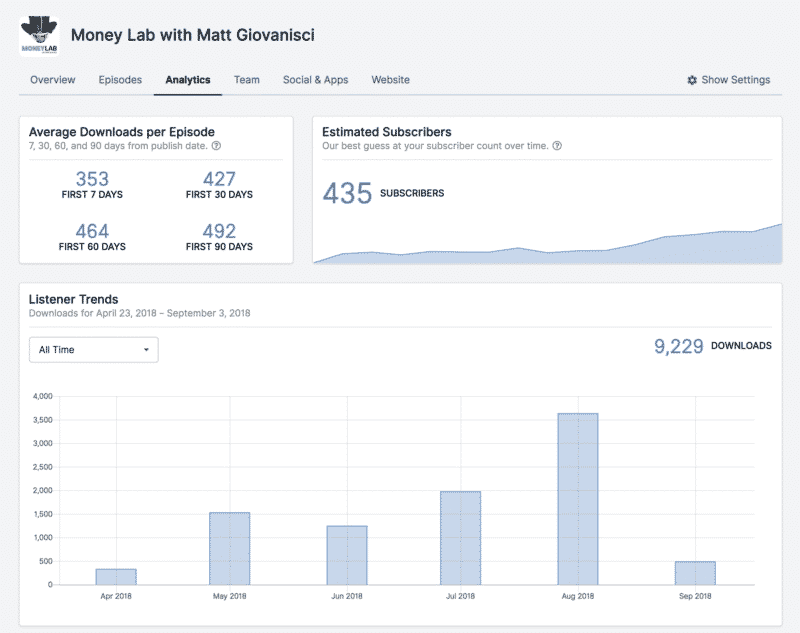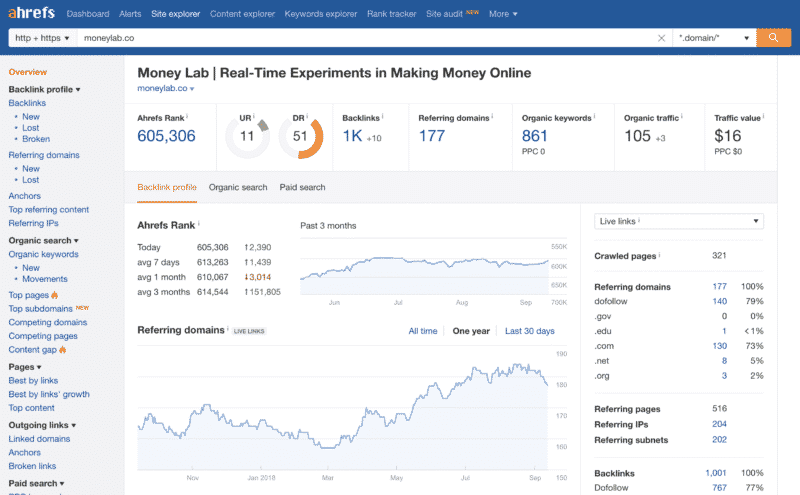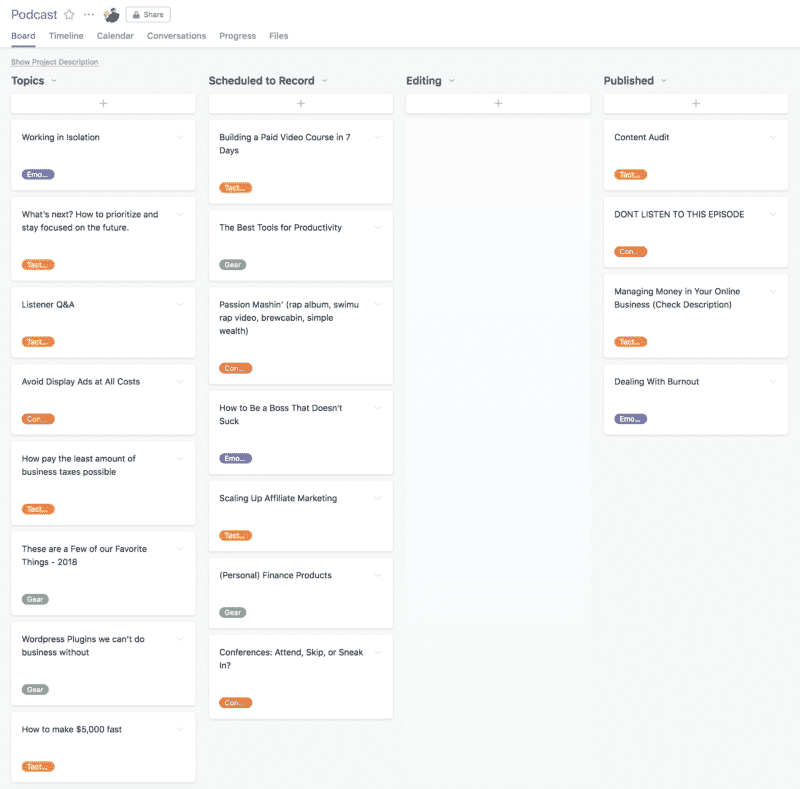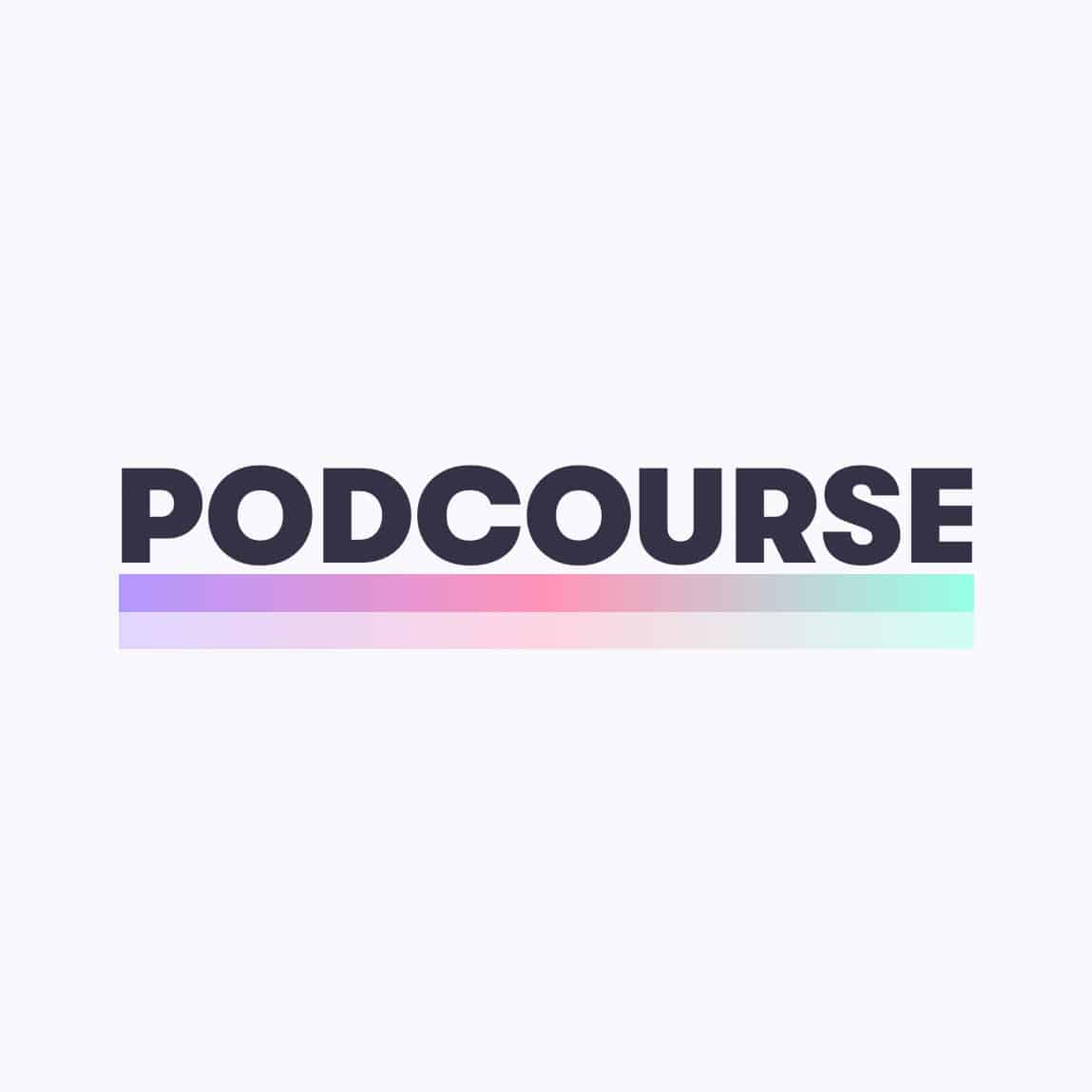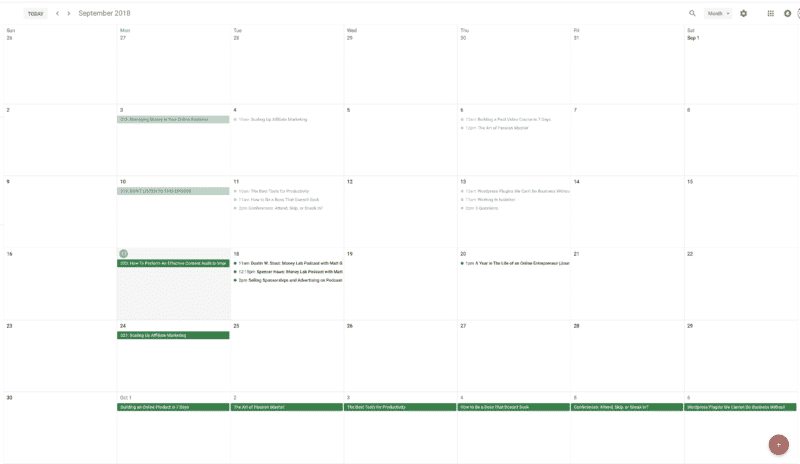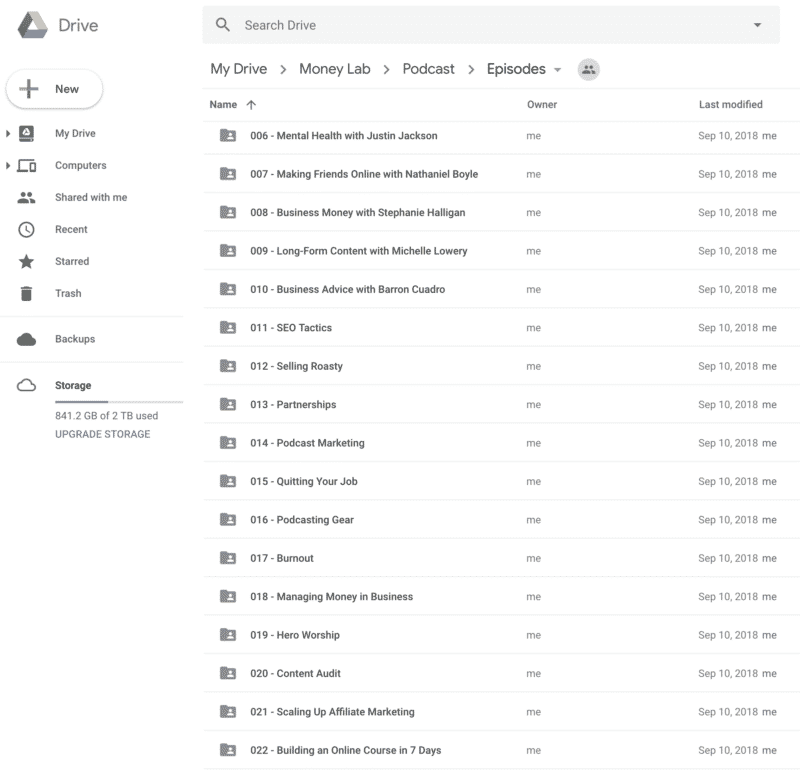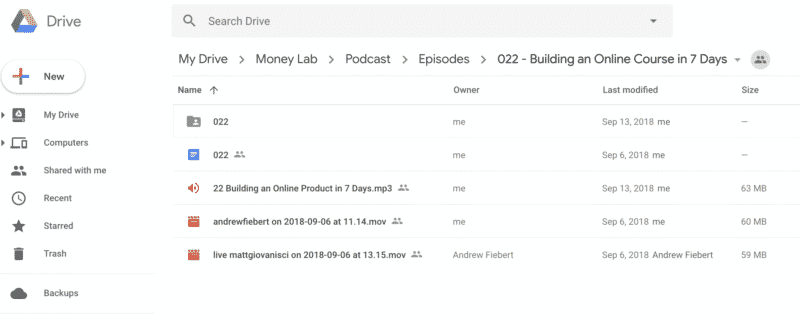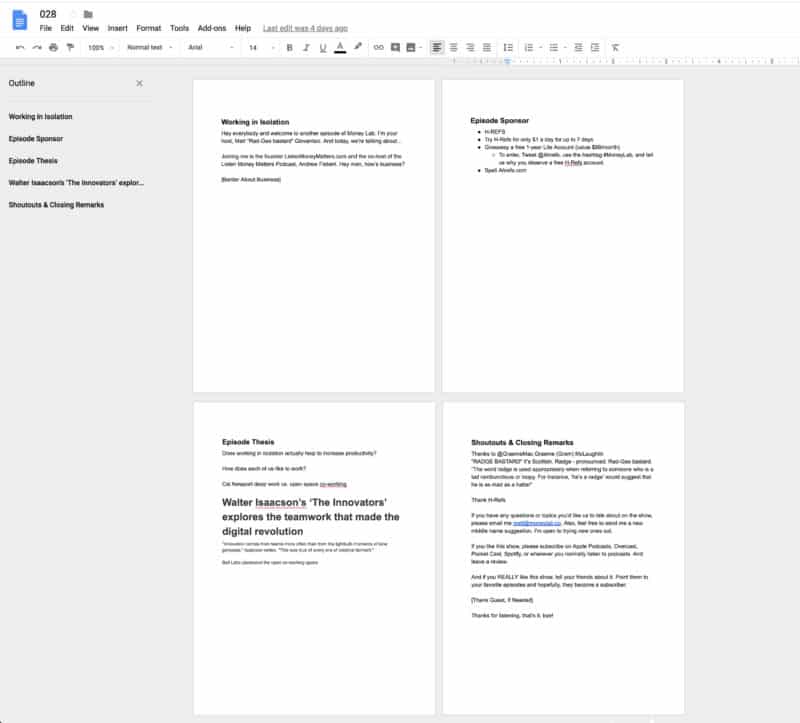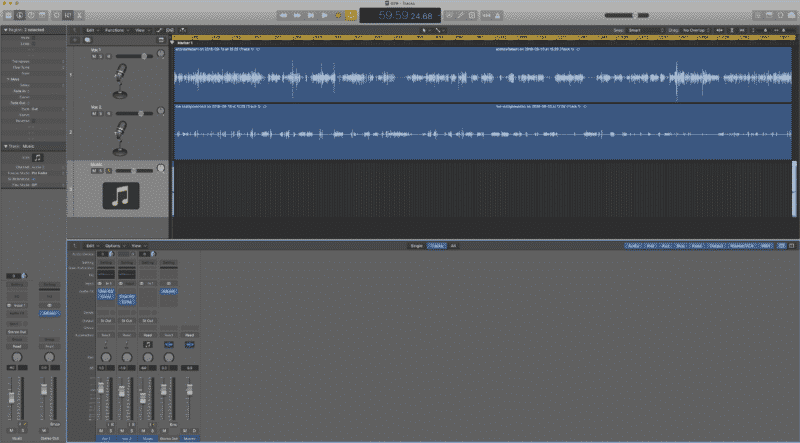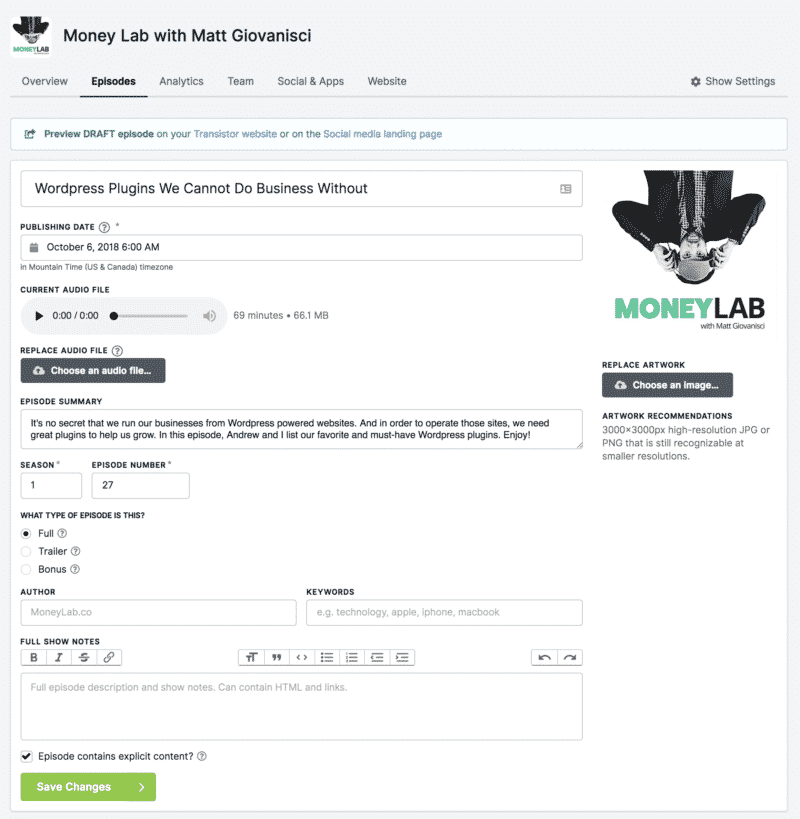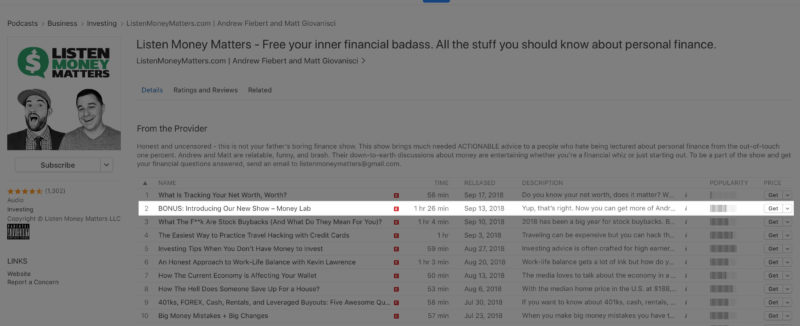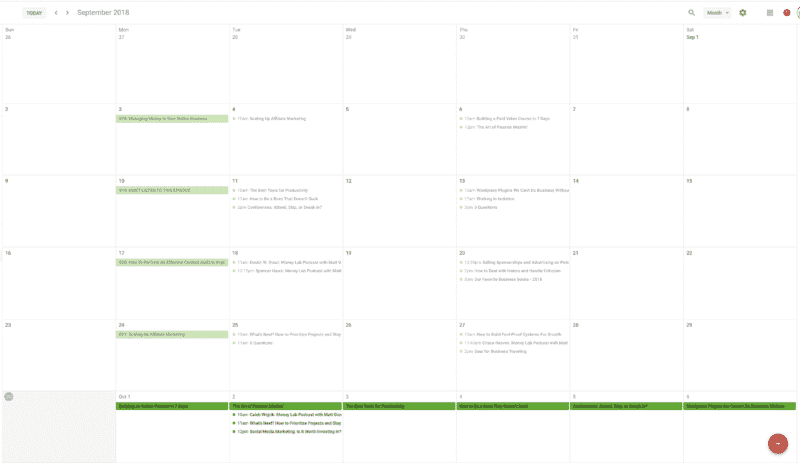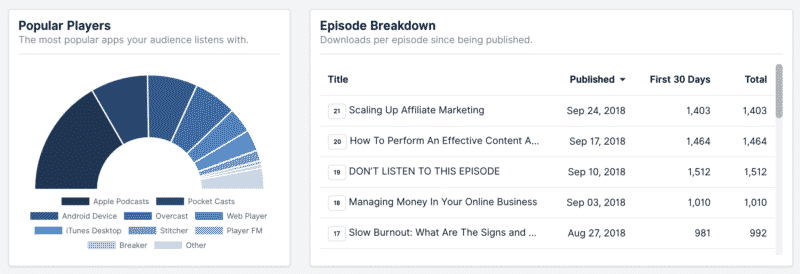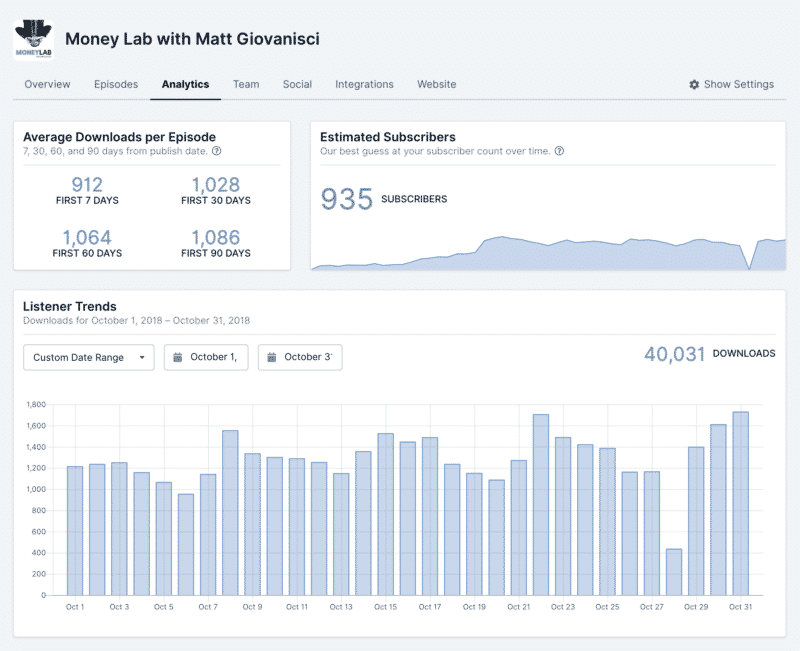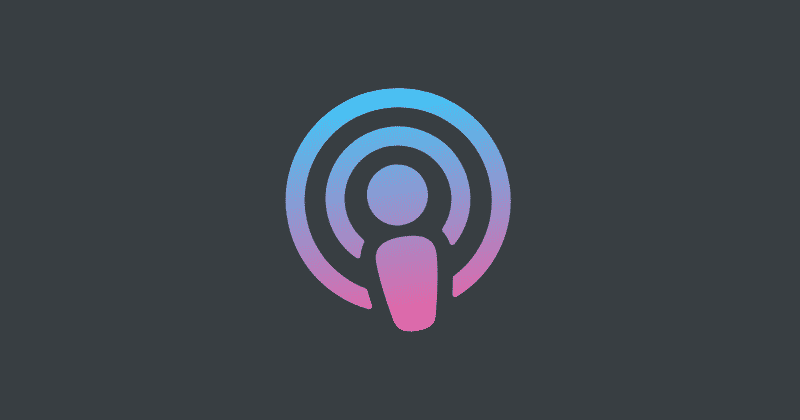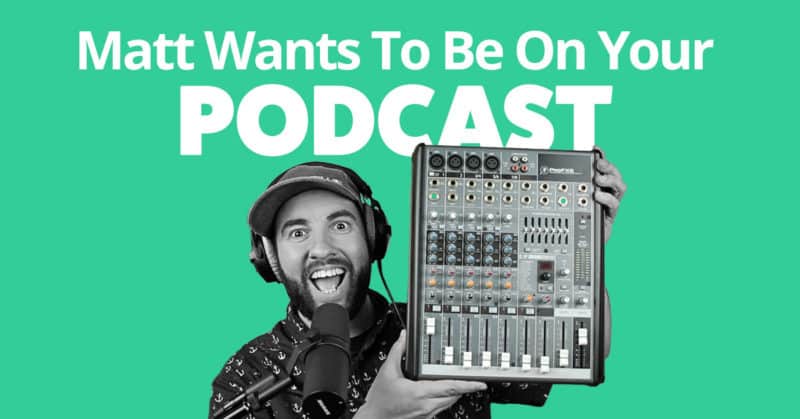In case you don’t know what I do or what this site is about, you should read my about page. And you can read a few choice pieces of content to get the gist. Like this one, this one, and maybe this one. However, if you already know, then you already know why I wrote this. Carry on.
I started a podcast around the Money Lab brand back in April 2018. The show is about building and running an online business. I invite guests to talk about advanced, high-level, inside baseball business topics.
It started with just me and some guests. But now I have a permanent co-host.
My friend Andrew Fiebert joined the show in July. We ran a personal finance website together and started the Listen Money Matters podcast in 2013.
After a year of doing a daily podcast with extreme growth, I burned out. And Andrew and I broke up. Like really bad. Screaming at each other! That sort of thing.
We talked about all that drama on the show.
He continued to host the podcast with Thomas Frank as my replacement for the last three years.
Then, just a few months ago, I rejoined Listen Money Matters as the co-host. And Andrew joined the Money Lab podcast. And that’s where we are at the beginning of this project.
The purpose of this experiment is to push the Money Lab podcast through extreme growth using what we learned from running another successful show. And our goal is simply more fucking subscribers!
Sorry for the gratuitous language already.
The Hypothesis
This experiment is to prove you can quickly grow a podcast using techniques that worked before. Basically, we want to see if we can do it again and if our strategy is repeatable.
The Listen Money Matters Podcast consistently ranks in the top 100 business podcasts on iTunes, even though it’s a show about personal finance. But we got there by doing a daily podcast first.
Our Strategy that Worked Before
When we first started the show in late 2013, we were producing one episode a week. And for the first eight months, we barely grew. By May of 2014, we had a whopping 200 downloads an episode.
Then I pitched an idea to publish an episode every day for a month to see if that would boost the subscriber count. Andrew agreed and we called it “Money May.”
In May 2014, we published a new episode of Listen Money Matters every day and the podcast grew significantly. How significant? Honestly, I don’t remember. Maybe I can get Andrew to do some research and I’ll publish the cold, hard facts here later.
What I can say for sure is it was significant enough for us to continue to produce a daily show for the rest of the year. And our growth continued.
I remember our downloads reaching 5,000 per episode in August of 2014. That’s was the magic number where advertisers would take your show seriously.
Of course, it wasn’t just about producing a bunch of shows. There were other factors that are much harder to attribute to the show’s success: having popular guests, word of mouth, and being written about on other websites.
Knowing what worked, we put together a strategy to ramp up Money Lab:
- Produce a new episode every day in October 2018. The theory (according to Rob Walch of Libsyn) is that downloads in the last 24 hours are an important ranking factor in iTunes. So the more podcasts produced in the shortest amount of time might send Money Lab up the rankings and allow more people to see it. At the very least, it gives the show a nice base of content for new subscribers.
- Get booked on several other successful podcasts. Based on my own podcasting listening behaviors, the only way I find out about new podcasts is if a podcast is mentioned or recommended on another podcast I’m listening to. I trust the host and I’m already in the podcast app. I can quickly find the show and subscribe. This seems like the most frictionless way to get new subscribers in my opinion.
- Booking big guests. The idea here is trying to appear in more search results for popular keywords inside iTunes and other podcast apps. My assumption is, people use the iTunes search to look for podcasts or people they already know about. For example, they’re searching the name Tim Ferriss to find Tim Ferriss’ podcast. So if that’s true, by having Tim on my show, when you search for his name my show is likely to appear also. Now, getting Tim might be difficult, but I have some other high-profile contacts I might be able to book.
- Leveraging Listen Money Matters. This might not seem fair, but we’re going to promote Money Lab on our already popular show. The biggest drawback here is audience overlap. LMM is about personal finance and ML is about business. Might not be a lot of people who would make the jump, but it’s worth a shot.
- Leverage the existing audience. Money Lab has listeners and we will come up with a plan to activate them into promoting the show during this marketing burst.
BTW, I came up with the term “marketing burst.” I’m proud of it and hope it catches on. Others might call it a “marketing blitz,” but those people are assholes.
What We’re Starting With
First off, we’re starting with an existing podcast. However, as I write this, the podcast has been delisted from iTunes because “the author field or title field contains extraneous information” according to Apple’s support team.
I fixed the issue, but I’m still waiting for Apple to review, and hopefully, approve my podcast again. Fingers triple dog crossed.
Here are the current stats of the podcast thanks to the killer analytics in Transistor.FM (the podcast hosting company I use and highly recommend and not because they have an affiliate program – I learned about that much later).
What I love is the Estimated Subscribers metric. That’s what I’ll be monitoring during this experiment.
Also, I’ve already been booked on two big podcasts. I’ll be on The Fizzle Show to talk SEO and the BiggerPockets Money show to talk about experiments like this one.
Both of those shows were booked before we decided to do this big push. However, I don’t know when either of those episodes will be published.
The Sponsor
Thanks to the hard work from the Listen Money Matters team, we were able to secure an exclusive paid sponsor for every episode in October. This makes me giddy to announce that our sponsor is Ahrefs – my favorite SEO tool EVER!
Since the start of the Money Lab podcast, the only sponsor has been my own SEO video course (where I mention the shit out of Ahrefs). So I’m thrilled to finally have a real sponsor of the show.
The List of Episode Topics
I’m writing this at the beginning of September. We’re still a month away from the daily publishing month. But we have to start recording those episodes NOW!
The first step we did was come up with a list of episode topics. We just quickly riffed off a bunch over Skype and stored them in a Google doc.
Then we categorized each topic into 4 categories (and of course I color-coded them):
- Tactic – a show where we describe how to do something business-related in detail.
- Concept – we discuss a business concept and/or argue whether or not it should be practiced.
- Emotional – getting to the heart of the “why.” The struggles, the pain, the joy, and the rollercoaster ride that is running your own business.
- Gear – products, software, and other shit we like. Pretty self-explanatory.
We also might sprinkle some listener Q&A episodes in there too.
I took all the topics and added them to my Asana project for the Podcast. Here’s a look:
Our List of Upcoming Episodes
- Building an Online Product in 7 Days
- The Art of Passion Mashin’
- The Best Tools for Productivity
- How to Be a Boss That Doesn’t Suck
- Conferences: Attend, Skip, or Sneak In?
- Working in Isolation
- WordPress Plugins We Cannot Do Business Without
- Avoid Display Ads at All Costs
- How To Pay The Least Amount of Business Taxes Possible
- How to Make $5,000 Fast
- The Art of Buying and Selling Websites with Spencer Haws from Niche Pursuits
- Maybe You Shouldn’t be a Solopreneur with Justin Jackson from MegaMaker
- What It’s Really Like to Sell a WordPress Plugin with Dustin Stout of Social Warfare
- Concept to Physical Product with Caleb Wojcik
- Paying for Social Media Advertising
A podcasting course from Pete McPherson of DoYouEvenBlog.com.
The Entire Podcast Production Process
We started recording on September 4th, 2018. But I’m not going to lie, it’s been kinda hard.
The Struggles of Recording Daily Episodes
Andrew and I have a tendency to bullshit for hours about business and not actually hit the record button. That’s what we get for being friends who have the same business type and like to help each other out.
Don’t get me wrong, it’s fun to bullshit. But it’s not productive.
I’m writing this as of September 12th and we only have four episodes recorded for October. However, we’ve been recording twice a week on Tuesdays and Thursdays. Our goal is to try and record four episodes each day. If we do that, we’ll have episodes recorded up until October 26th before we even get into the month.
I doubt that will happen, but we’re going to try really hard.
Scheduling Recording Sessions
We have a huge list of topics. I’ve been scheduling them on our shared Google calendar on Tuesdays and Thursdays. The solid green events are when the episode is published, and the events with times are recording days.
I don’t want to schedule our recording days too far in advance. I need to leave room for booking guests. We are using Calendly to do that.
Preparing The Episode
This is my job. I keep all our episodes in Google Drive folders. I have to do a little bit of prep work. Here’s what our folder structure looks like:
In each folder, we have a few files:
- The Show Notes (Google Doc named 022)
- Our recorded files (.mov files from eCamm Call recorder)
- The Logic Pro folder/file for editing (Folder 022)
- The finished episode MP3 with ID3 tags
Before we record an episode, I create a new folder based on the episode number. We start with three digits because of how folders are ordered. For example, if we originally named the folders simply “1, 2, 3, 4,” then episode 1 and 11 would end up next to each other.
That’s why I put a 0 in front of the episodes. In case you were curious. I didn’t think you were, but I told you anyway.
Once the folder is created I make a copy of the previous episode’s show notes and edit it to reflect the new content. I update the title/topic, my middle name, the episode thesis, and who to thank for my middle name.
I separate each section of the episode template into different pages and I make the font pretty large so I can read it. Here are all the show note pages for a single episode:
Recording An Episode
Andrew and I use Skype. We hop on, discuss the show notes a bit, and then hit record. We use eCamm Call Recorder for Skype. We set it to record the audio only, but we use video to read each other’s body language. This is a must for all podcasting episodes for me. It stops me from talking over people.
We both have eCamm and record both sides. He hits record, then I hit record. That gives us clean, native tracks for me to work with in editing.
We could use Quicktime, but using eCamm gives me a failsafe. If one of us fucks up the recording, at least I’ll still have both sides of the convo – just one side will sound a little shittier. It’s better than re-recording an entire episode.
Once we’re finished recording, we upload our files to the Google Drive folder for that episode. That makes it easy for me to find the recordings when it’s time to edit.
Editing An Episode
I like to edit in batches. My last editing sesh was eight episodes at once. It took me one hour.
The reason it doesn’t take me that long is how we record. We do EVERYTHING live. All I have to do in editing is add the intro and outro music. I also trim the beginning and ends.
I don’t listen to the entire episode. I know if it’s good after we record. If it sucks, I’ll make a note so I can fix it in editing. Not to brag or anything, but that doesn’t happen much 😉
I use Logic Pro X to edit. I’ve been using this program for over 15 years. Mostly for music production and now for podcast editing. Here’s what a finished episode looks like:
As you can see, there’s not a lot to it. I have a template I copy and paste each time. I can edit a podcast in under 5 minutes. The longest part is exporting.
I export episodes as MP3s at 128kbps in mono (or joint stereo). That ends up being a megabyte per minute. I could probably reduce it down to 96kbps, but I want it to sound pretty decent and I think that rate sounds like shit.
Once the episode is edited and exported, I import it to iTunes and create the ID3 tags. Then, I export that as the finished MP3 and store it in the proper Google Drive folder.
Uploading and Publishing
This part can be pretty time-consuming. I have to upload the MP3 file to my podcast host. I use Transistor.FM which is owned by Justin Jackson (he’s on episode 006) and I love it. Just really simple.
I create a new episode, start uploading the file, and add all the show details.
The episode is scheduled and will automatically publish on that date. That’s the entire process of producing a single podcast episode for Money Lab.
Leveraging Listen Money Matters
Our original podcast on personal finance has a lot of subscribers and downloads. So to give Money Lab a bump, we included a teaser episode in the LMM feed. We didn’t want to do this in October, so we did it in the middle of September. Here’s what it looked like in the feed:
On September 13th, the Money Lab podcast saw 599 downloads because of that bonus episode. We don’t have the official count yet, but I’m assuming that will double our subscriber count.
As of September 17th, we have roughly 515 subscribers to the Money Lab podcast. I see that number increasing to 1,000 before October hits.
The First Day of Daily Episodes
I’m writing this on September 30th, 2018. Tomorrow is the first day of 31 daily published episodes.
We’ve been busy recording episodes every Tuesday and Thursday for the last four weeks. On good days, we can record four episodes. On not-so-good days, zero.
This is our shared Google Calendar between Andrew and I. It shows both the times we scheduled to record episodes and when they’re published. The solid green events are the publish dates. The events with times are when we record.
This is a finished calendar, so you can see what we’ve already recorded and what we still have scheduled.
As of today, we have episodes finished and scheduled up until October 15th. We also have four episodes recorded, but not edited yet. I like to edit in batches of six eps or more.
So we’re covered until October 20th before the month even starts. Not too bad.
It would be awesome to finish all the episodes by the first week of October. We’ll have to do some overtime in order to accomplish it, but Andrew and I are both anxious to get this done so we can get back on a normal schedule of recording just once a week with little pressure.
Let’s Start Tracking The Numbers
We’re assuming that by publishing daily episodes, we’ll hack the iTunes ranking algorithm. This should send the podcast up the charts and help more people to find us. Then, this will put us on a fast cycle of subscriber growth.
Again, that’s the hypothesis here. But we have to know where we’re starting from. Because in September we did see a lot of growth from guesting on other successful podcasts.
If we look at the episode analytics in Transistor.FM, you can see that our more recent episodes received about 1,400 downloads an episode. So we can assume that we have roughly that many subscribers. And it’s mostly from Apple Podcasts.
So let’s put it in stone that the Money Lab podcast is starting the experiment with 1,400 subscribers.
Let’s Start Tracking The Ranking
I only check iTunes because I believe that’s what really matters. A lot of other podcast companies use the same data, I believe. I only say that because when I added my podcast to iTunes, all the other players (like Pocket Casts) automatically had it.
I check two places:
- Top Podcasts in Business
- Top Podcast in Management & Marketing (A Business Subcategory)
As of today, Money Lab does not rank in the top 200 podcasts in Business. And we also don’t rank in Managment & Marketing.
So, we’re starting from the bottom.
Let the fucking games begin!
The Final Recap
In short, the experiment didn’t turn out the way we hoped.
The Numbers
On October 1st, our total download numbers were 1,216. On the 31st, it peaked at 1,732. That’s a 42.43% gain.
This doesn’t seem that bad, but for all the work required, it didn’t feel significant.
This is the total download numbers for each day in October. It DID go up, but only slightly. This really just came from publishing. We did no other promotions in October to affect this upward trend.
The big dip on October 28th is because I’m a big dip and forgot to upload the MP3 for that post.
What Didn’t Work
- We thought publishing daily episodes alone would earn us more subscribers by shooting us up the Apple charts. It didn’t. In fact, we never broke the top 300 in Apple’s Career Podcasts (A subcategory of Business). Ok, maybe a few times, but still…
- Guesting on podcasts with a poor market fit. I was a guest on Fizzle and Bigger Pockets Money. Both of which didn’t significantly increase subscriber counts on the podcast or website.
- Publishing every fucking day. We got some listener feedback that indicated it was too much. There were too many episodes to listen to and they couldn’t keep up. I think this was largely due to the length of the episodes.
What Worked
- Guesting on other podcasts with a good market fit. Just Niche Pursuits really. I think this makes sense since Spencer and I have a very similar brand.
- Putting a Money Lab episode in the Listen Money Matters feed. We got a nice bump in downloads after that happened. We need to continue promoting ML on LMM for it to continue to pay off. However, it’s not the greatest crossover fit.
- Being honest and transparent. This is something we knew would work from Listen Money Matters. People can see through the bullshit. And Andrew and I are just not bullshitters. We are too honest, sometimes to a fault.
- Publishing every day. Hear me out. It helped us quickly figure out what was working and what wasn’t.
The Most Popular Episodes By The Numbers (Initial Downloads)
- Building an Online Product in 7 Days (Ep 22 – 10/1/18)
- The Best Tools For Productivity (Ep 24 -10/3/18)
- 5 Questions: Setbacks, Focusing, and Morning Routines (Ep 29 -10/8/18 a Monday)
- The Art of Passion Mashin” (Ep 23 -10/2/18)
- 5 Questions: Money, Goals, and Spreading The Word (Ep 36 – 10/15/18 a Monday)
It’s pretty clear that Monday was a good day for the podcast even though we were publishing every day. And not just total downloads, but Monday episodes tended to do the best.
Not sure if it was because it was a 5 Questions theme or if Monday is just a good day to download podcasts.
The Most Popular Episodes By The Listener Feedback
- Create Content That Stands the Test of Time (The Fly-On-The-Wall Episode 35). This was by far the most positive feedback we got during the whole month. It was a conversation we recorded where we were just talking about biz with no agenda. Then I edited the convo together. Took me the longest to edit because I actually had to listen to the whole thing to make sure we didn’t put anyone on blast 😉
- The 5 Questions Format. We knew this would be popular from Listen Money Matters. And it just so happens to be our favorite type of episode to record. I think we’ll continue to do these.
- The Episode with Chase Reeves (Ep 38). This was just a weird, but entertaining, ep where we got into the weeds about Chase’s biz decisions.
Other than those, it was a mixed response. Some people really liked the tactical episodes where we talked about podcasting gear or productivity tools. While others like the story-driven and concept episodes where we showcased our transparency and honesty.
It was split. Not sure how to deal with that feedback yet.
The One Thing That Everyone Could Agree On
The overwhelmingly positive feedback we got throughout the entire month was the fact that our show was honest. People liked that we cut through the bullshit. That we shared our failures and successes (with context).
I’d like to share some of those direct quotes from our listeners anonymously.
“I like a podcast that is more like you are in a bar, talking to some friends about your week, where you want to talk yourself and contribute. I felt like I can be part of the conversation.”
I like that it’s centered around entrepreneurs and building a business, I do enjoy listening to you two discussing wins and losses and ideas for growing your own businesses, as well as different topics about any new ways to handle an area or tool to grow a part of your business is very helpful.
Pretty much all of the [episodes] gave the nitty and gritty, which I enjoy. In-depth, no bullshit. I’ve listened to the philosophical stuff, which is important, but I was getting tired of the “surface” look of the online entrepreneur. I like the “behind the scenes” stuff, how it really works, the good and bad.
Honest, real conversation. The flow/chemistry between you both is enjoyable. Audio quality is excellent which I appreciate. The topics covered that perhaps others aren’t willing to discuss. Three examples come to find are the Hero Worship episode (Ep 19), the social media episode (Ep 42) and the ebook pricing episode (Ep 44). All challenged me and made me think deeper about what it’s like to understand your audience versus copying info marketing tactics from other industries.
What would make me share this podcast without hesitation (and is why I do share it) is because of the honesty. I literally tell people “if you’re tired of business podcasts, go listen to Money Lab” because the reality is that there are a million people out there who listen to all the interview podcasts, all the Gimlets, all the startup stuff, and it gets old. It’s surface level. So my only piece of advice is to get radically more transparent, more detailed, and more honest.
Thank You
First, I want to thank Andrew for recording every episode with me. We both spent a lot of time recording and discussing the production of the show.
I want to thank everyone who listened during the month and will continue to listen going forward, even if we’re not publishing every day. And thank you to everyone who told their friends about this show, emailed their feedback, and suggested new middle names for me.
As always, I have to thank the love of my life (Steph Halligan) for helping me craft some of the episodes and for talking me through all my ups and downs with producing this show and trying to make it better.
Andrew and I are committed to improving the show. We want to make the show we wish existed for people like us. We want to be honest, transparent, and vow to never spit bullshit or spin things to make something more palatable.
We are going to create a show for people who love to do the work. And share what it’s really like and what it takes to build a business online. As easy as it sounds to turn on a microphone and tell the truth, turning that into something listenable and entertaining is actually pretty hard.
Challenge accepted!
